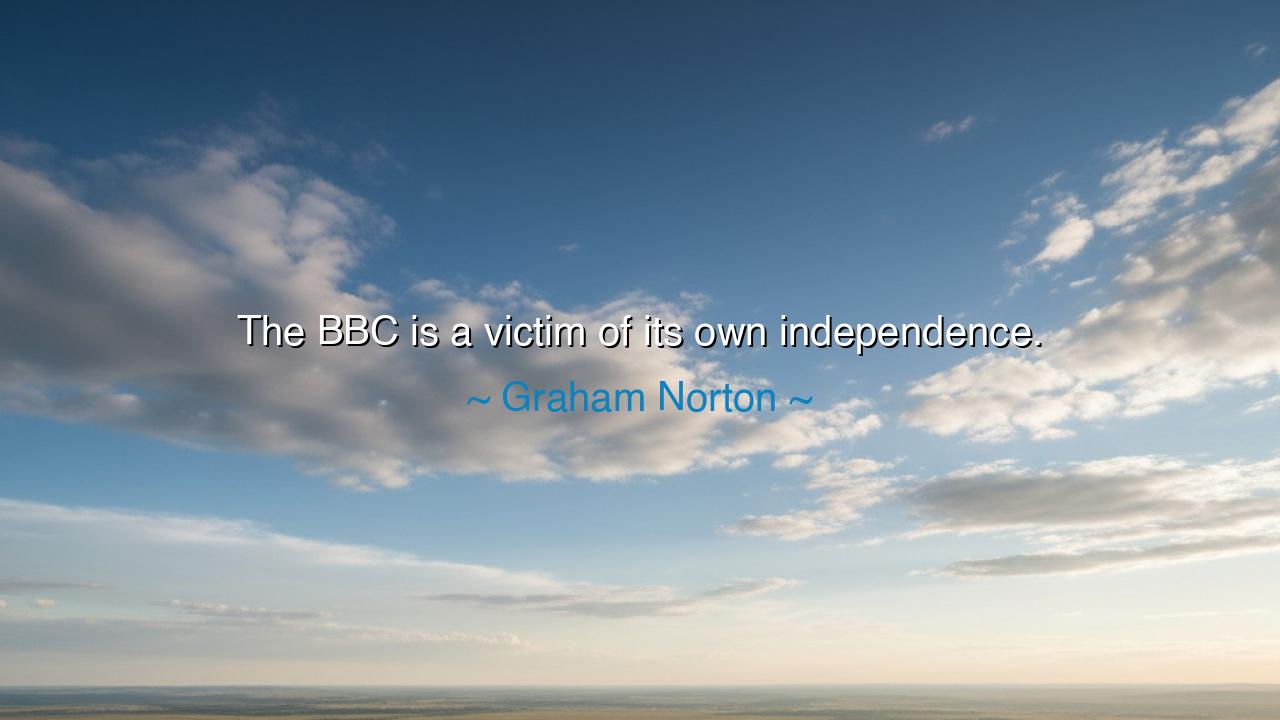
The BBC is a victim of its own independence.






“The BBC is a victim of its own independence.” Thus spoke Graham Norton, a man whose craft is laughter yet whose insight cuts deep. His words, though spoken of a broadcasting institution, touch on an ancient paradox — that independence, though noble and hard-won, carries within it the seed of struggle. For freedom, once attained, demands from its bearer both strength and humility; it liberates, but it also isolates. In this single sentence, Norton reveals a truth that applies not only to organizations and nations, but to the human soul itself: that to stand apart, to govern oneself, is a gift of immense worth — and a burden of equal weight.
The origin of this quote lies in the nature of the BBC, the British Broadcasting Corporation — a body founded to inform, educate, and entertain, yet set apart from the machinery of state and commerce. It was born in the aftermath of empire, in an age when Britain sought to speak both to its people and to the wider world with honesty and balance. Its great power, and its great challenge, lay in its independence — for it belonged to no political party, no profit-driven owner, no empire of opinion. It was the voice of a nation’s conscience, answerable only to its people. Yet, as Norton’s words suggest, that very independence, meant to protect its purity, also exposed it to misunderstanding and attack. Without allegiance, it was accused by all; without protection, it stood alone. Thus the BBC, in seeking to remain free, became its own victim — revered, yet perpetually assailed.
This condition is not unique to the BBC. Throughout history, those who have chosen the path of independence have faced both reverence and reproach. The philosophers of ancient Athens, who refused to flatter the powerful, were accused of corrupting the youth. Socrates, that great teacher of reason, drank the hemlock for his defiance — a victim of his own intellectual freedom. Galileo, who dared to look through his telescope and see what the Church forbade, was confined for daring to think independently. Even nations, after winning their freedom, often find that liberty is not peace but a new kind of trial — for once unbound, they must learn to govern themselves. So it is with the BBC: its independence, though virtuous, demands of it a perfection that no institution can sustain.
In Norton’s words, there is both irony and admiration. He sees in the BBC’s independence the very source of its greatness — its ability to question, to challenge, to uphold truth — and yet, that same freedom leaves it vulnerable to the fury of those it displeases. For the independent spirit, whether of man or institution, cannot please all. To be impartial is, paradoxically, to be accused of bias by all sides. The BBC’s steadfastness in its mission has made it both trusted and attacked; its refusal to serve a single master has ensured that it serves none perfectly. In this, Norton’s observation becomes a parable for the ages: that true freedom demands the courage to withstand misunderstanding.
Consider, for a moment, the story of Mahatma Gandhi, whose movement for India’s independence was rooted not in violence but in conscience. When freedom finally came, it was accompanied not by harmony, but by division and bloodshed. The dream of independence had triumphed — and yet, the new nation found itself torn by the very forces freedom had unleashed. Gandhi himself, the architect of that liberty, fell victim to his own ideals — slain not by enemies, but by those who misunderstood his vision. His story, like that of the BBC, teaches that independence is not a shield from suffering, but the measure of one’s endurance amid it.
And so, the deeper meaning of Norton’s words unfolds: to be independent is to walk a lonely road. It is to choose integrity over comfort, truth over favor, and authenticity over applause. The BBC, in its refusal to bend to power or profit, reflects the ancient wisdom that the purest voices are often the most contested. Like the solitary oak that stands apart from the forest, it must weather storms that others, bound together, do not feel. Yet it is that solitude that gives it strength, and that endurance that grants it honor.
Let this, then, be the lesson drawn from Norton’s insight: that independence, whether of mind, nation, or institution, must not be sought for ease, but for truth. To be free is not to escape criticism — it is to face it with dignity. The one who walks alone must walk wisely, and the one who speaks without allegiance must speak with fairness. Whether in our work, our art, or our lives, we must learn to bear the burden of freedom — to be misunderstood, to be challenged, to be refined by struggle.
For in the end, as Norton reminds us, the victimhood of independence is also its glory. The BBC, though assailed, endures because it belongs to no one and serves all. So too must we, in our own lives, seek that same balance: to be independent, yet compassionate; to stand firm, yet humble. For only those who are free within themselves can truly serve others — and only those who endure the trials of independence can know the full dignity of being their own.






AAdministratorAdministrator
Welcome, honored guests. Please leave a comment, we will respond soon